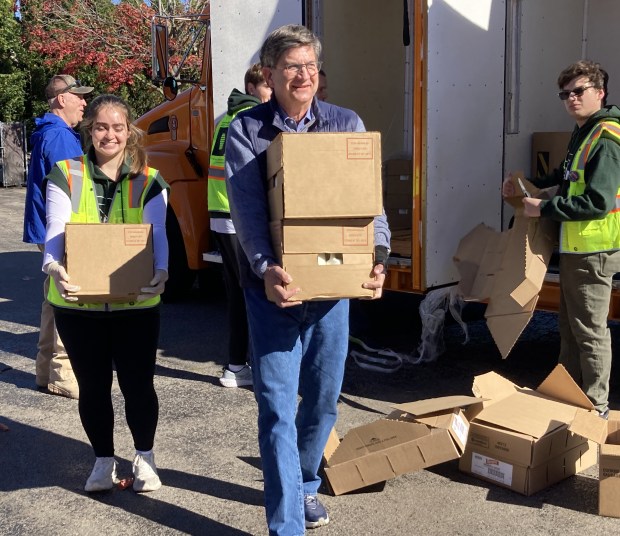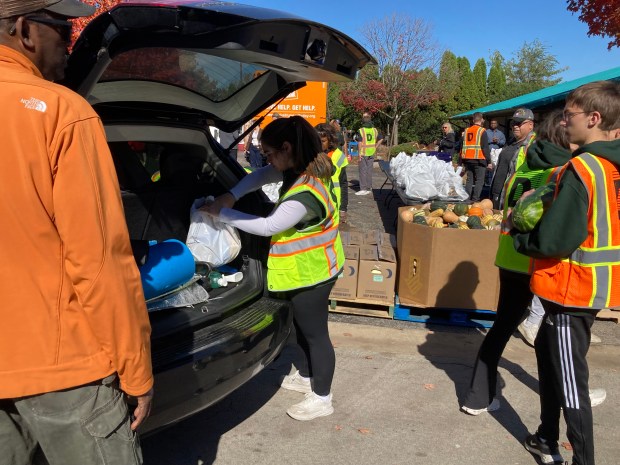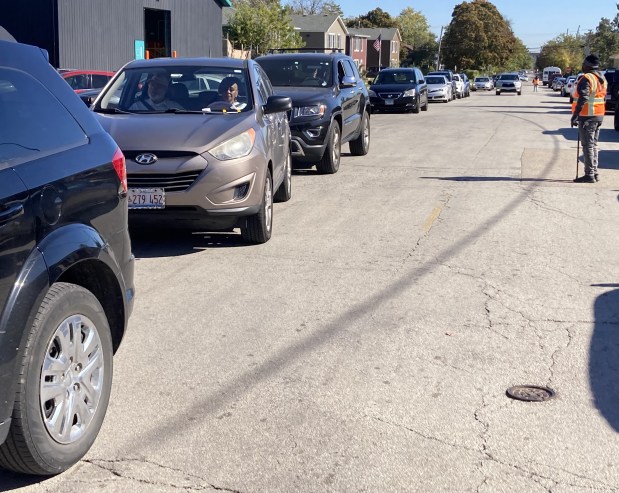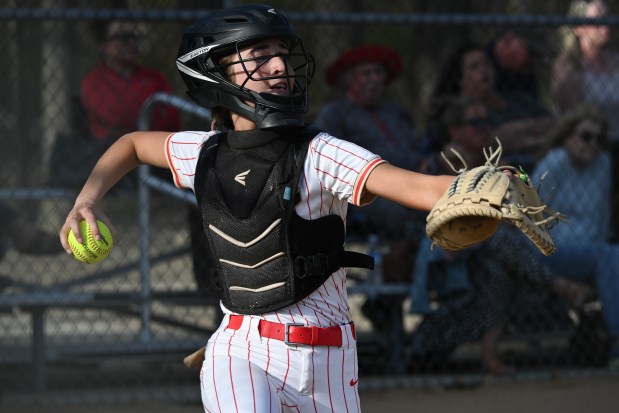Car after car containing members of 202 families of active-duty military personnel or U.S. military veterans got in line for a free food distribution event Thursday put on by the Northern Illinois Food Bank at the Midwest Veterans Closet.
Asked why they needed food assistance, spouses of three sailors and two uniformed naval petty officers helping with the distribution had the same answer — inflation.
Araine Mason, who lives in housing at Naval Station Great Lakes with her Navy husband and their four children, was getting food for her family.
“Food is getting more and more expensive,” she said. “The kids are on school break and they are eating more at home,” she added, referring to her children who attend schools in North Chicago School District 187, where they receive breakfast and lunch free each day.
Giving out the food were area volunteers, members of the New Trier High School Green Club and elected officials U.S. Rep. Brad Schneider, D-Highland Park, state Sen. Julie Morrison, D-Lake Forest, state Rep. Rita Mayfield, D-Waukegan, and state Rep, Bob Morgan, D-Deerfield.
The Northern Illinois Food Bank and Midwest Veterans Closet hosted the drive-through distribution in North Chicago, both to help feed the sailors and veterans and seek legislative help from the officials.
Robert Desio, the food bank’s manager of public policy and benefits, said roughly 25% of active-duty military personnel experience food insecurity — 2.5 times more than the general population — and federal legislation is needed to remedy the situation.
Desio said legislation is pending in the U.S. Congress which would ease the way for military households to receive help from the Supplemental Nutrition Assistance Program (SNAP), and it needs to be enacted.
Schneider, who is a co-sponsor of the bill, said he hopes to see it soon pass. He said he also understands the impact of rising food prices on military families and others. He hears about it regularly from constituents. He also thinks members of the military should be paid more.
“We should lift barriers that prevent some military families from becoming eligible for SNAP benefits,” he said after the event. “We should also work toward ensuring servicemembers are paid a living wage.”

Helping to distribute groceries were Navy petty officers Arrington Jenkins and Jamar Pegues. They are both stationed at Naval Station Great Lakes and know families who have needed food assistance. The need has become more acute for Navy personnel, they said.
“With inflation the way it is, it’s getting harder,” Jenkins said. “Someone can be deployed anywhere in the world, and then there’s only one parent to take care of the children. It’s harder on all of them.”
“Inflation is really hurting us,” Pegues added. “It’s getting to a level where it gets harder to take care of ourselves and our families.”

Mary Carmody, the founder of the Midwest Veterans Closet, said she sees more veterans and active-duty military who need not only help with food, but with clothing, particularly with winter coming.
“We don’t ask questions when they come,” Carmody said. “We just help them.”
Roy Colver, a Waukegan resident and former member of the U.S. Marine Corps, volunteers at the Veterans Closet. He said a military family may be getting along without food assistance one day, but in the armed forces things can change quickly.
A member of the military can be deployed overseas, and a working spouse now must care for the children and work. They often spend less hours at their job and more time at home caring for the youngsters.
“They get spread real thin, and have to spend the dollars on something else,” Colver said.
Jae Small is married to a man who is in his 18th year in the Navy. She volunteers at the veterans closet because she has been the recipient of food assistance in the past. The couple have two children.
“Some of (the sailors) barely earn enough to get by,” Small said.





